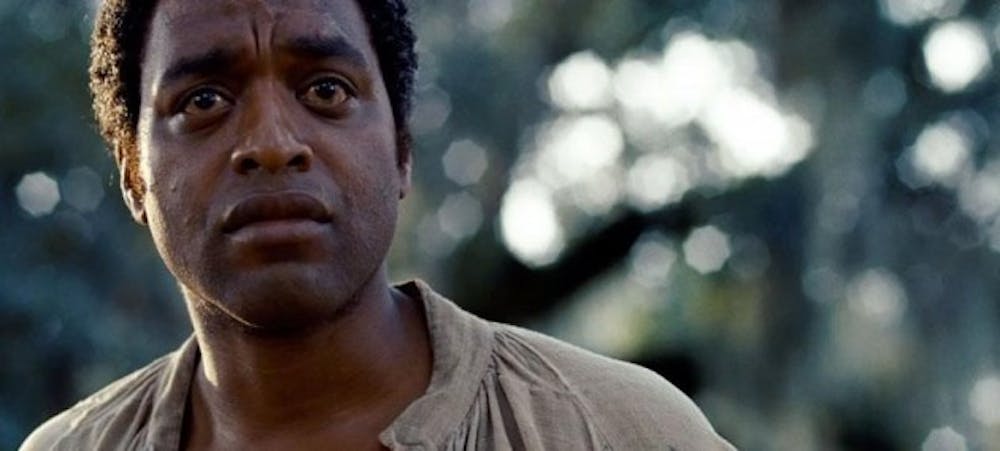Film: 12 Years a Slave
Distributor: Fox Searchlight
Nationwide Release Date: Nov. 1
Grade: A
Fran?\0xA4ois Truffaut once said it was impossible to make an anti-war film. The depiction of war, he believed, was exciting and provided a sense of adventure; he also felt the problem was the end always belonged to its survivors and the spectator would end up feeling happy for the few rather than sad for the many.
Stanley Kubrick reportedly expressed similar criticism of Schindler's List - that the story is about success though the Holocaust is about failure. In the book Eyes Wide Open, author Frederic Raphael wrote that Kubrick said: "Schindler's List is about 1,000 people who survived; the Holocaust is about six million people who died."
A similar sentiment could be echoed in regard to films about slavery - that when the protagonist survives or becomes free, the viewer feels good for the survivor.
12 Years a Slave, the new film by Steve McQueen, tells the true story of Solomon Northup, who wrote a memoir of the same title, published in 1853. The film's marketing campaign has emphasized this detail, claiming it as a marker of its authenticity. Audiences know coming into the film that Northup is a survivor - for he has lived to tell the tale.
What makes this film exceptional is that even with it being a survival story, never does it put its audience at ease - never do you feel good about what you are watching. Because never before has a film so acutely depicted the horrors of slavery.
The very first shot is of black men, including Northup (Chiwetel Ejiofor, Salt), lined up beneath the frame's horizon in a field of tall grass before they are taught to cut sugar cane. McQueen is able to evoke the emotional currents of a particular atmosphere in this single shot; he immediately makes a statement of how slaves were treated by use of visual imagery.
The film then cuts back in time to Northup as an accomplished violinist, living comfortably with his wife and children in Saratoga Springs, N.Y. One day, a pair of gentlemen lures him into a trip to Washington, D.C. to hear about a lucrative offer. They get him drunk and the next day he wakes up in chains.
It is then that he is sold into slavery and transported by ship to a cotton plantation in Louisiana. This begins his 12-year period as a slave in which he is treated as property - exchanged, loaned out and used as payment for debt.
During this time, he has a seething sense of injustice that comes not from the very act of slavery in and of itself, but from the rage of knowing he has been taken wrongly; he was born free and has been kidnapped.
When we see him try to write a letter home with the juice of berries, we see the level of desperation that comes out of a desire to be free. The entire time he is enslaved, he knows that only if he could contact those who know him in New York, they could provide the documents that would release him.
His first slave owner, William Ford (Benedict Cumberbatch, Star Trek Into Darkness), is a generous man, ironically sympathetic to the plight of his own slaves. When he is forced to sell Northup to Edwin Epps (Michal Fassbender, Prometheus) for Northup's safety, however, we see why he might feel he is doing his slaves a service - the alternatives are worse.
One of the most powerful moments of the film comes after Northup instinctively defends himself against a sadistic overseer (Paul Dano, Looper) while Ford is away. He is then almost killed for it. As they begin to hang him from a tree, one of the other white men stops them, reminding them Northup is Ford's property. Northup is then left to droop with one foot reaching the ground as the life of the plantation carries on in the background. Eventually, Ford returns and cuts him loose.
When he gets to Epps' plantation, Northup becomes enmeshed in a sexual conflict between Epps and his luscious field slave Patsey (Lupita Nyong'o). Epps' wife (Sarah Paulson, Mud) makes matters worse with her tantalizing belittling of her husband. Epps is such a psychotic lunatic, there is an irony to his actions - he is as much a prisoner to himself as his slaves are.
This leads to a hysteric madness and brutality that is rarely brought so vividly to the screen; the debasement of human dignity that transpires is an assault on our deepest values.
There is a prolonged whipping scene in which Epps forces Northup to strike Patsey; it condemns slavery stronger than any other moment. It is an emotionally evocative and vivid portrait of violence, in which psychological compulsions and unrestrained obsessions meet in a noxious entanglement of unbearable cruelty.
What becomes the center of this searing and daring work is how it portrays the moral condition of slavery in the most intolerable way. It is an examination of America's greatest failure - the piece of our history that continues to haunt us.
Unlike Quentin Tarantino's Django Unchained, which took heavy material and reduced it to an adolescent sensibility, McQueen allows no room for humor or fun to be inserted into this picture; he treats the subject with the despondency it deserves. Not resting on making the film merely a cathartic experience, he lets it make the audience uncomfortable and lets it stay that way.
And that is where the film's emotional power resides: It doesn't let you leave the theater feeling relieved.
There are moments of such solemn beauty and inherent sadness; the film's visual language is its own source of reflection. Director of Photography Sean Bobbitt (The Place Beyond the Pines) has a way of shooting tactile images of natural surfaces: the Louisiana trees, the sopping dirt, the various slaves' lacerated skin.
Working with John Ridley's (Red Tails) precise and controlled script, McQueen knows how to make subtlety work and can handle transitions from static despair to kinetic energy. There are some moments, however, of overdramatized and forced dialogue that seems out of place in a work that takes its power from its subtlety.
But it all comes together in what may be the finest film ever made about slavery, an institution that too often seems distant and abstract. This film puts it in the right context - it makes slavery closer to us and concrete. It makes it real.
Elegantly constructed and thematically profound, 12 Years a Slave, is a mesmerizing study of humanity. It is a look at moral abandonment through the lens of the darkest chapter in American history.
Northup's tale gives voice to those who didn't live to tell their own stories. And the film is a lamentation for a past that must be confronted. By doing so, we take one step closer to reconciling with it.
email: arts@ubspectrum.com





